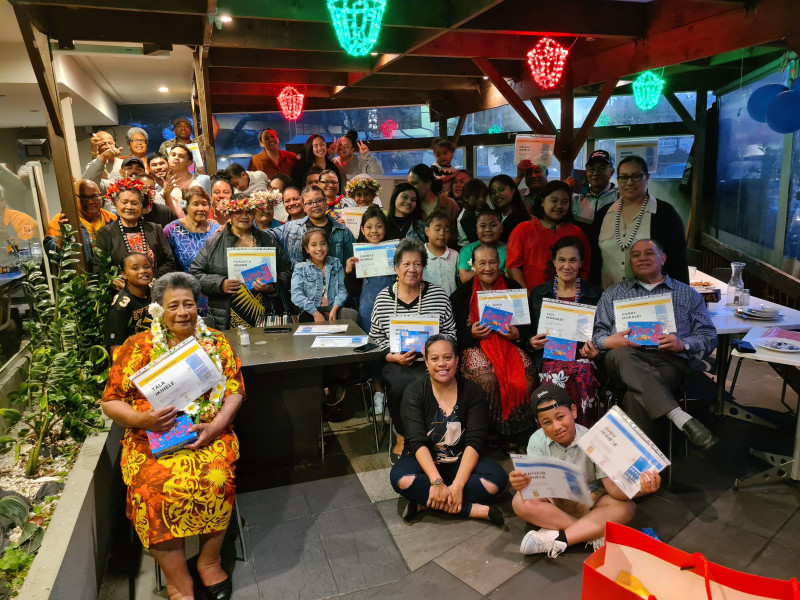Pacific youth connectors of digital knowledge for elders
Pacific youth connectors of digital knowledge for elders

(Picture caption: Intergenerational learning takes place at DIGIFALE.)
In an age where digital connectivity is so integral in daily life, Pacific communities are most at risk of being digitally excluded.
However, provider Moana Connect is working hard to rectify this trend, particularly with our older Pacific community members through the digital literacy training for seniors programme, driven by the Office for Seniors and supported by the Ministry for Pacific Peoples (MPP).
Moana Connect is a Pacific social enterprise consisting of researchers, clinicians, and community workers, and in April 2020, the organisation established DIGIFALE, an intergenerational initiative that centres Moana communities and digital health equity.
General Manager Community and Innovations at Moana Connect and Programme Lead for DIGIFALE Amio Matenga Ikihele says when COVID-19 caused New Zealand to go into lockdown in March 2020, it quickly became apparent access to digital platforms was not going to be equitable for our Pacific communities, especially our Pacific elders.
“Our Pacific communities are considered most at risk of being digitally excluded, which is concerning as they are the same population groups who experience worse social and health outcomes, and poorer access to primary healthcare services,” Amio says.
“When Pacific communities can navigate digital spaces, they can use these skills to access online services to make informed choices to improve and manage their health and wellbeing…our vision is every fale benefits from being a DIGIFALE.”
Recently, the Office for Seniors announced Moana Connect would join digital training providers Digital Inclusion Alliance Aotearoa, 2020 Communications Trust, 360 Tautua, Takiri Mai Te Ata Trust and Age Concern Auckland to deliver essential digital skills courses for up to 5,000 learners around the country.
Training is particularly targeted to deliver digital skills training in a way that works for diverse groups of older people, including older Māori, Pacific and East Asian people.
In the past two years, Moana Connect has been scaling up its DIGIFALE training and education alongside Pacific ethnic communities including Tongan, Fijian, Samoan, Cook Island, Niuean across Auckland, Wellington and Dunedin, working with more than 250 elders and 150 navigators, Amio adds.
While the focus of DIGIFALE is on Pacific seniors, she says DIGIFALE also acknowledges a new negotiation of social and cultural roles, with younger family members providing essential digital and mobile skills for their elderly parents and grandparents.
“This is an important cultural shift - just as elders have a vital role in passing on cultural knowledge from one generation to the next, young people become important conduits as they transmit knowledge of using digital technologies with their elders.
“They also bridge and strengthen intergenerational relationships and communication as they provide an important support network for their elders navigating a new digital world.
“This is what excites us most as Pacific elders and young people are navigating digital spaces together.”
While there is no doubt COVID-19 has enabled more people to navigate digital spaces, Amio says there are still many families and Pacific elders who are still unable to do this.
“Our vision is Pacific communities are able to navigate digital spaces and online services to improve their health and wellbeing and to do this, we combine grassroots community engagement, cultural and social capital, advocacy, and research to provide the necessary access, connectivity, and skills required to improve digital literacy, digital health literacy, and digital health equity.”
Barriers to digital inclusion can include a lack of access to devices or connections, the skills needed to use them or mistrust of the online environment and the programmes focus on supporting older people to develop the skills to get online safely and confidently.
To help address barriers to accessing devices, the Office for Seniors and MPP will deliver up to 450 computers in support of digital training for older Pacific people via their providers.
The Office has also been supported by the Ministry of Social Development to maximise the programme’s reach to this community.
This expanded three-year programme includes funding for robust evaluation of the training.
Māori and Pacific people aged 55 and over can access the free training due to challenges faced such as experiencing significant health issues sooner than others.
Other seniors can access the free training aged 65 and over.
Visit the DIGIFALE website and the Office for Seniors’ website for more information.
